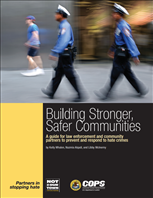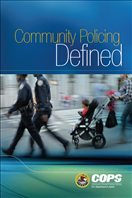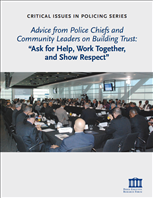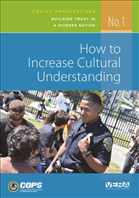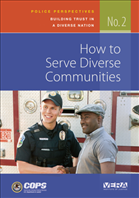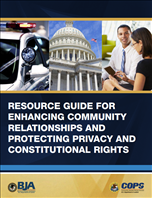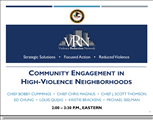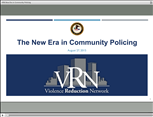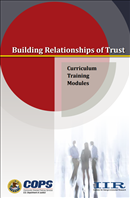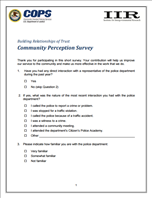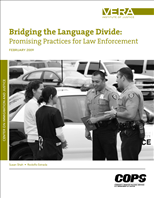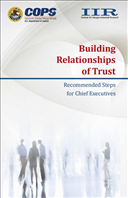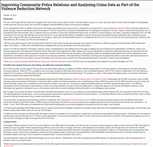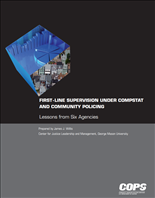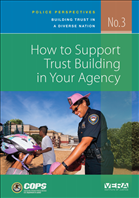Building Stronger, Safer Communities: A guide for law enforcement and community partners to prevent and respond to hate crimes
Building Stronger, Safer Communities: A Guide for Law Enforcement and Community Partners to Prevent and Respond to Hate Crimes offers leadership strategies and actionable tactics to help law enforcement agencies work with community partners. Real-life examples, documented by the Not In Our Town movement against hate and intolerance, illustrate how agencies can work with community stakeholders to create an atmosphere where hate is not tolerated and take positive steps in the aftermath of a hate crime. This guide also explains the history of the Not In Our Town movement and provides multiples lists of resources to promote action, engagement, and empowerment for the community and law enforcement.
Community Policing Defined
Community policing is a philosophy that promotes organizational strategies that support the systematic use of partnerships and problem-solving techniques to proactively address the immediate conditions that give rise to public safety issues such as crime, social disorder, and fear of crime.
COPS Office Resource Center
The COPS Office publishes materials for law enforcement and community stakeholders to use in collaboratively addressing crime and disorder challenges. These free publications provide best practice approaches and give access to collective knowledge from the field. At the COPS Office Resource Center you can find recent and featured publications, and you can also search the Resource Center or the Community Policing Topics pages for specific issues.
Advice from Police Chiefs and Community Leaders on Building Trust: “Ask for Help, Work Together, and Show Respect”
PERF gathered chiefs and community members to hold discussions about issues of force and the level of trust in the police in communities. This document is a compilation of discussions from that meeting and summarizes key observations and strategies for improving relationships between police agencies and the communities they serve.
How to Increase Cultural Understanding
Recognizing the vital importance of trust to community cooperation, public safety, and national security, the Vera Institute worked with the Office of Community Oriented Policing Services to research and write this three-part series, which provides practical, field-informed guidance for creating positive, productive relations with all members of our multi-racial, multi-ethnic American population. To engage with their communities, law enforcement must understand their needs and concerns. This guide explores the history of law enforcement's relations with African Americans and offers strategies for overcoming past mistakes, building trusting relationships, and using mediation and other means for increasing dialogue and reducing tension after contentious incidents.
How to Serve Diverse Communities
Recognizing the vital importance of trust to community cooperation, public safety, and national security, the Vera Institute worked with the Office of Community Oriented Policing Services to research and write this three-part series, which provides practical, field-informed guidance for creating positive, productive relations with all members of our multi-racial, multi-ethnic American population. Law enforcement faces many challenges in building relationships with new immigrants, teenagers, and transgender communities. This guide provides practical guidance for overcoming language and cultural barriers, promoting dialogue with teens, developing anti-gang strategies, establishing youth mentorship programs, and understanding the safety concerns of the transgender community.
New Perspectives on Community Policing
New Perspectives on Community Policing is a free, web-based training course that examines how change, emerging issues, and threats are necessitating a reinvigorated commitment to the key components of community policing: community partnerships, organizational transformation, and problem solving.
Nobility of Policing
FranklinCovey’s highly interactive Policing at the Speed of Trust program helps individuals in your organization identify and address “trust gaps” in their own personal credibility, in their relationships at work and in the community. Using examples based on their current work and focusing on real-world issues rather than theories or academic models, participants in the Policing at the Speed of Trust program will contribute to high trust in the organization
Policing at the Speed of Trust
Policing at the Speed of Trust is a full day workshop that provides tools to help law enforcement professionals to identify, build, extend and restore trust in their professional and personal relationships.
Resource Guide for Enhancing Community Relationships and Protecting Privacy and Constitutional Rights
Law enforcement professionals are charged with preserving the peace and protecting life and property. Effective law enforcement requires trust and mutual respect between law enforcement agencies and the communities they serve. Progress has been made in enhancing these relationships as a result of community policing efforts over the past several decades. More recently, a number of police departments are embracing procedural justice to build community trust, particularly among communities of color where relationships with police have been strained for many years.
VRN Webinar: Community Engagement in High-Violence Neighborhoods
The recent events in Ferguson, Missouri, and New York City, New York, and subsequent protests across the country have highlighted the importance for police to partner with the community to establish sustainable relationships. Community engagement provides tremendous opportunities for working together and pooling resources to strengthen police legitimacy and reduce violence in our communities. During this Webinar on community engagement, participants learned about innovative approaches to engaging communities in high-violence neighborhoods. Mr. Ed Chung of the DOJ National Center for Building Community Trust provided opening remarks about national perspectives and strategies, and then participants heard from three chiefs of police (Chief Scott Thomson from Camden, New Jersey; Chief Chris Magnus from Richmond, California; and Chief Bobby Cummings from Wilmington, Delaware) regarding their experiences and expertise in community engagement before opening up the discussion to the entire VRN network.
VRN Webinar: New Era in Community Policing
In the post-Ferguson era, as communities continue to voice concerns regarding police shootings and unfair policing practices and in the wake of the recommendations of the President's Task Force on 21st Century Policing, police agencies across the country are rethinking their tactics and their community relationships. Relatedly, as the concepts of procedural justice, constitutional policing, collaborative reform, collective efficacy, and community outreach and collaboration increase in importance in the world of policing, it is important to integrate or reintegrate these concepts and practices into police operations. For several reasons then, there is a need to build police agency interest and capacity in the areas of community policing and collaboration. This Webinar reviewed key concepts and definitions, such as "procedural justice," "collaboration versus engagement versus cooperation," "intelligence-led policing," and "smart policing," and presented contemporary and promising police practices regarding outreach and collaboration in communities that are characterized by chronic high violence.
Building Relationships of Trust: Curriculum Training Modules
This in-service orientation course assists officers in building relationships of trust.
Building Relationships of Trust: Community Perception Survey
A police department should distribute this survey to community members pre- and post-implementation of a building relationships of trust initiative.
Bridging the Language Divide: Promising Practices for Law Enforcement
Law enforcement officers have to communicate with the people they serve to do their jobs safely and effectively. Yet this communication has become a challenge due to changing demographics across the United States. Many agencies throughout the United States have already developed practices that can either serve as model solutions or spark ideas for innovations. To identify and disseminate these new models, the U.S. Department of Justice's Office of Community Oriented Policing Services (the COPS Office) partnered with the Vera Institute of Justice to conduct a national assessment of best practices for overcoming language barriers in policing. This report discusses the most promising practices and also provides practical resources, such as sample job descriptions, that agencies can use when crafting their own programs.
Community Policing Self-Assessment Tool
The Community Policing Self-Assessment Tool (CP-SAT) is a web-based agency-wide survey that helps law enforcement agencies (LEA) measure their progress in implementing community policing. The CP-SAT confidentially captures information about community partnerships, problem solving, and organizational impact.
Building Relationships of Trust: Recommended Steps for Chief Executives
A key component of successful policing is building collaborative, trusting relationships between law enforcement and the communities they serve, immigrant and minority communities. Developing these relationships allows law enforcement to more successfully address the challenges of crime control and terrorism prevention. The knowledge and insight that come from trust-based relationships between law enforcement and the community are critical because they allow law enforcement to distinguish between innocent cultural behaviors and behaviors indicative of criminal activity. The checklist on the following pages summarizes the recommended steps executives should consider when working to build relationships of trust with members of their community. As outlined in the document, this process must begin at the executive level but should be implemented department-wide. Implementation of these recommendations will enable agencies to more easily build and sustain those relationships. Each of the steps is outlined in more detail later in this document.
Improving Community-Police Relations and Analyzing Crime Data as Part of the Violence Reduction Network
As part of its VRN site selection, Wilmington received a series of assessments to help identify some of the gaps in strategy that were impeding the implementation of effective violent crime reduction approaches. One assessment indicated that the Wilmington Police Department (WPD) needed crime analysis capabilities, including the underlying technology and personnel with the requisite skill set to support practical analytical techniques. Working with the WPD and their site liaison, VRN developed a plan that leveraged existing data to improve police deployments and established a foundation to build capacity for long-term crime analysis capabilities. Wilmington Police Chief Bobby Cummings also recognized the need to improve the relationship between the police department and the community so that he could better rely on the community to assist with improving the Department's outcomes in violent crime investigations.
First-Line Supervision Under Compstat and Community Policing - Lessons from Six Agencies
Over the last 25 years, Compstat and community policing have emerged as powerful movements in U.S. police reform. Despite their importance, there are virtually no studies on how they work together when implemented in the same police organization. This report, the third in a series studying this co-implementation issue, focuses on front-line supervision. Patrol sergeants play a key role in what the police organization does and how it does it, yet little is known about how this rank has adapted, if at all, to the co-implementation of Compstat and community policing.
How to Support Trust Building in Your Agency
Recognizing the vital importance of trust to community cooperation, public safety, and national security, the Vera Institute of Justice worked with the Office of Community Oriented Policing Services to research and write this three-part series, which provides practical, field-informed guidance for creating positive, productive relations with all members of our multi-racial, multi-ethnic American population. This guide is a resource for agency leaders who want to build trust with the diverse communities they serve by adopting community policing practices and transforming their organizations. It provides practical strategies for diversifying their workforce, implementing and promoting community policing principles, and training officers in bias-free, culturally aware policing.
Project Longevity
Project Longevity is a Community and Law Enforcement initiative to reduce serious violence in three of Connecticut's major cities: New Haven, Bridgeport, and Hartford. Project Longevity is modeled after successful efforts implemented in communities across the country. Project Longevity uses a unique combination of Community Involvement, Social Services, and Focused Policing to positively influence group dynamics. Project Longevity calls in group members across the community to receive a very important message from Law Enforcement and Community Representatives.
